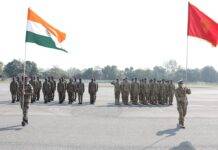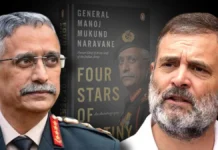In a rare case ,the tenure of India’s Chief of Army Staff, General Manoj Pandey, has been extended by one month and that too just 6 days before his retirement (on May 26). It is not clear who will be the next chief of the Indian Army. In India, Army Chief does not usually get such extension in service. The reason behind giving extension to General Pandey as COAS could not be known but it is believed that this decision is one of the decisions taken at the political level.
With the completion of the seventh and last phase of the voting process for the Lok Sabha elections in India next month i.e. in June 2024, the new government is expected to be formed within a week. The decision about the new army chief has probably been postponed till then. It also means that the decision for posting the next Army Chief has been left to the new incoming government.
Decision on extension of service:
According to the Defence Ministry, the Appointments Committee of the Cabinet approved one month extension in the service of General Manoj Pande. The Appointments Committee on May 26 approved the extension in service of Army Chief General Manoj C Pande for a period of one month beyond the normal age of retirement (May 31) till June 30, under Rule 16A (4) of the Army Rules, 1954.
In India, the Army Chief retires on completion of three years of appointment or on attaining the age of 62 years, whichever is earlier. The current Army Chief, General Pande, had turned 62 on May 6 and was scheduled to retire on May 31.
Who is General Manoj Pande:
General Manoj Pandey took over the role of 29th Chief of Army Staff after the retirement of General MM Narvane on April 30, 2022. Prior to this appointment, General Pandey served as the Deputy Chief of Army Staff. General Manoj Pande was to retire from service on May 31 after a tenure of 25 months. General Pandey was earlier the Deputy Chief of the Indian Army. The case of appointment of General Manoj Pandey was an exception because General Pande is the first officer of the Corps of Engineers to lead the Indian Army.
During his distinguished career, General Pande also held the post of Commander-in-Chief of Andaman and Nicobar Command, India’s only tri-service command. An alumnus of the National Defence Academy, General Pande was commissioned into the Corps of Engineers (The Bombay Sappers) in December 1982.
Extension in the past:
The extension of service given to General Pande is the first such decision in almost five decades. Earlier, the Indira Gandhi-led government had extended the tenure of Army Chief General G G Bewoor for one year in April 1974, General Bewoor retired on May 31, 1975. In the very next month i.e. June 1975, an emergency was imposed in India which lasted for 22 months.
According to military experts, due to the extension given to General Bevoor, Lieutenant General Prem Bhagat retired without becoming the Army Chief. General Bhagat was a very respected officer. Before General Bewoor, Field Marshal Sam Manekshaw had received the extension after victory in the 1971 war. Pakistan had to face defeat in this war and it was divided into two parts, out of which East Pakistan changed to Bangladesh.
Contenders for the post of Army Chief:
After Army Chief General Manoj Pandey, Lieutenant General Upendra Dwivedi is the next senior officer of the Indian Army. After Lieutenant General Dwivedi, the next in line is Southern Command Commander Lieutenant General Ajay Kumar Singh. But the interesting thing is that both officers , Lieutenant General Dwivedi and Lieutenant General Singh, are coursemates and are going to retire on June 30. On the same day, the extension given to General Pandey is also ending. However Lieutenant General Dwivedi has extensive operational experience on the borders with China and Pakistan.
Lieutenant General Upendra Dwivedi took over as the Deputy Chief of Staff after Lieutenant General MV Suchindra Kumar. If the new government thinks beyond Lieutenant General Dwivedi and Lieutenant General Singh, then Central Command Commander Lieutenant General NS Raja Subramani can be the main contender.















